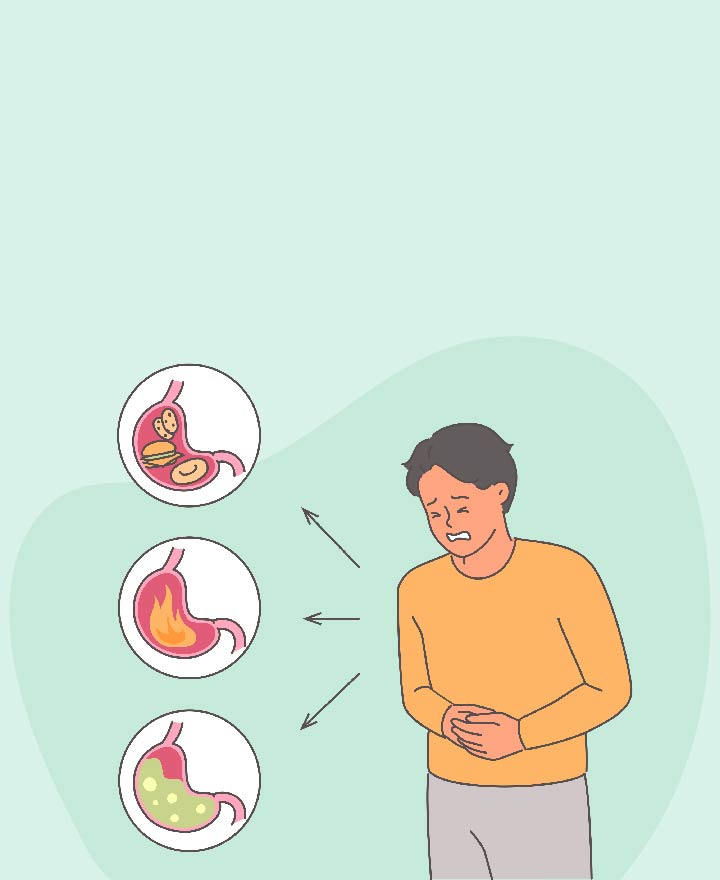

All You Need To Know About Peptic Ulcers
Peptic ulcers are formed when the digestive juices and enzymes produced in the GI tract penetrate the protective mucous membranes and enter the stomach or duodenum. If you are wondering about the peptic ulcer meaning, this condition was named after the digestive enzyme produced in the stomach, pepsin. H. Pylori, or the Helicobacter pylori bacterial overgrowth, is the main trigger for peptic ulcers. Sometimes, overuse of OTC medications (usually painkillers) can also cause these. While these can be cured by medicines in the early stages, when left untreated for a long time, they can lead to certain health risks. Read on to know more.
Symptoms of Peptic Ulcers
The two main types of peptic ulcers are duodenal and stomach (gastric) ulcers, with duodenal ulcers contributing to at least 80% of the conditions diagnosed today. In rare cases, the digestive juices may enter other parts of your gastrointestinal (GI) tract to cause an oesophageal ulcer or a jejunal ulcer.
According to experts, more than 70% of patients don’t experience any gastric ulcer symptoms. In the few cases where people do feel certain signs, the following symptoms are quite common:
• Pain in the middle of the upper abdomen (also known as epigastric pain)
• Gnawing feeling in a particular place of the abdomen (also known as focal abdominal pain, which happens when the juices corrode the GI lining)
• Pain, burning sensation and discomfort in the stomach within 30 minutes of eating (happens in stomach ulcers)
• Pain, burning sensation and discomfort in the stomach 2 to 3 hours after eating, but a sense of relief immediately after eating (happens in duodenal ulcers)
• Pain in the lower part of the abdomen, especially near the belly button (happens in jejunal ulcers)
• Severe heartburn, especially at night (happens in oesophageal ulcers)
• Stomach bloating
• Frequent burping and/or belching
• Loss of appetite
• Nausea
• Vomiting
The stomach ulcer symptoms in female and male members are not too different in most cases. When peptic ulcers are not treated on time, they can lead to several complications, where your GI tract can bleed, perforate, or get obstructed. In the unusual case of these health risks, the symptoms you will notice are:
GI bleeding
• Discharge of blood when passing stools
• Palpitations
• The stool appears to be extremely black, almost like tar
• Dizziness
• Pale-looking appearance
• Vomit appears to be in the shape and colour of coffee grounds (a condition known as coffee ground vomitus)
GI perforation
• Sudden but severe pain in the abdomen
• Sudden swelling in the abdomen
• The abdomen is very tender to touch
• Fever and body chills because of stomach pain
GI obstruction
• Constant swelling, pain and bloating in the stomach
• Nausea
• Vomiting
• Sudden weight loss
• Loss of appetite
• Irregular bowel movements leading to constipation
Causes
The two most popular triggers of peptic ulcers are:
• H. pylori infection
Helicobacter pylori (H. pylori) is a type of bacteria that lives in the protective mucous lining of the stomach and small intestine. In many cases, it doesn’t cause any symptoms. However, in some people, it can irritate the stomach lining and lead to inflammation. Over time, this irritation may result in the formation of ulcers.
• Excessive usage of nonsteroidal anti-inflammatory drugs (NSAIDs)
NSAIDs include the normal painkillers that you buy over the counter, often without the prescription of a doctor. These NSAIDs can reduce the production of prostaglandin hormone, a substance that repairs the GI tract lining issues.
These ulcers can also be caused by:
• Certain infections
• Ischemia
• Stress caused by injuries or trauma
• Medical procedures to treat cancer (chemotherapy, radiation treatment, etc.)
• Stomach cancer
• Other critical ailments, such as Crohn’s disease, Zollinger-Ellison syndrome, etc.
• Gastric bypass surgeries
• Oesophagitis (chronic inflammation in the oesophagus)
Risk Factors
You are more prone to peptic ulcers than others if you fall under one of the following categories:
• Smoke or consume alcohol excessively
• Take medications to treat the bone-thinning disease osteoporosis
• Experience ongoing, unmanaged stress
• Frequently eat spicy or acidic foods
• Are over the age of 60, as the stomach lining becomes more vulnerable with age
Possible Complications
If left untreated for long, peptic ulcers can lead to the following complications:
• Internal bleeding in the stomach or duodenum
• Perforated walls of the stomach and small intestine make you prone to peritonitis
• Blockages in the digestive tract, causing vomiting and weight loss
• Stomach cancer
Tips to Help Prevent Peptic Ulcers
Though you cannot completely avoid peptic ulcers, you can follow these simple preventive tips to reduce your risk of infection:
• Using NSAIDs sparingly
Always use OTC painkillers in moderation, and check with a doctor if these medicines don’t work for you the way you want.
• Quitting smoking
Reduced usage of cigarettes and tobacco-based products can help reduce ulcers in the GI tract.
Conclusion
Peptic ulcers are not very dangerous if you diagnose them on time and follow the recommendations of your doctor. However, if left untreated, they can lead to serious complications such as bleeding, perforation or infection, which may require hospital care and extended treatment. Having a reliable health insurance plan can ease the financial burden of such unexpected medical treatments and ensure you get the care you need without delay.
One of the important components of our overall wellness is also being financially secured. Healthcare emergencies can happen any time, but a good health insurance policy can protect you from such uncertain situations. To know more about Wellness and other health related tips, visit the wellness corner.
Source: nhs.uk, webmd, my.clevelandclinic.org
Disclaimer: This blog provides general information and discussions about health and related subjects. The information and other content provided in this blog, website or any linked materials are not intended and should not be considered or used as a substitute for medical advice, diagnosis, or treatment. Kindly contact your doctor before starting a new medicine or health regime.
Related Articles
What are the symptoms of Ulcerative Colitis?
The Most Common Digestive Disorders Diseases
Easy Home Remedies for an Upset Stomach
Published on July 11, 2025















 Health Insurance
Health Insurance  Travel Insurance
Travel Insurance  Car Insurance
Car Insurance  Cyber Insurance
Cyber Insurance  Critical Illness Insurance
Critical Illness Insurance
 Pet Insurance
Pet Insurance
 Bike/Two Wheeler Insurance
Bike/Two Wheeler Insurance  Home Insurance
Home Insurance  Third Party Vehicle Ins.
Third Party Vehicle Ins.  Tractor Insurance
Tractor Insurance  Goods Carrying Vehicle Ins.
Goods Carrying Vehicle Ins.  Passenger Carrying Vehicle Ins.
Passenger Carrying Vehicle Ins.  Compulsory Personal Accident Insurance
Compulsory Personal Accident Insurance  Travel Insurance
Travel Insurance  Rural
Rural